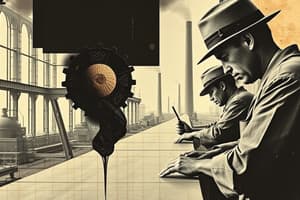Podcast
Questions and Answers
What was a significant impact of the Industrial Revolution on American culture?
What was a significant impact of the Industrial Revolution on American culture?
- Facilitating the preservation of traditional cultural practices
- Fostering urbanization and giving rise to a consumer-driven society (correct)
- Promoting agricultural practices and traditional craftsmanship
- Encouraging a shift towards rural living and self-sufficiency
How did the shift to industrial economies impact the United States?
How did the shift to industrial economies impact the United States?
- Propelled the nation into a capitalist system and contributed to wealth inequality (correct)
- Led to the establishment of a socialist economic model and reduced wealth inequality
- Promoted a feudal economic system and reduced economic disparity
- Resulted in a return to barter-based economies and reduced economic growth
What was a notable influence of industrialization on politics in the United States?
What was a notable influence of industrialization on politics in the United States?
- Decline of industrialists' influence and lack of impact on labor rights
- Negligible impact on the role of government in regulating industry
- Rise of industrialists as influential figures and debates over labor rights (correct)
- Shift towards an agrarian political landscape and reduced focus on worker conditions
What characterized the new social hierarchy that emerged during the Industrial Revolution?
What characterized the new social hierarchy that emerged during the Industrial Revolution?
How did the Industrial Revolution influence immigration policies in the United States?
How did the Industrial Revolution influence immigration policies in the United States?
What characterized the middle class during the Industrial Revolution?
What characterized the middle class during the Industrial Revolution?
What were the characteristics of the working class during the Industrial Revolution?
What were the characteristics of the working class during the Industrial Revolution?
Who were the leading reformers in America's First Great Reform Movement?
Who were the leading reformers in America's First Great Reform Movement?
What did Transcendentalism emphasize?
What did Transcendentalism emphasize?
What did the Reform Movement lay the groundwork for?
What did the Reform Movement lay the groundwork for?
What were some of the negative consequences of the Industrial Revolution mentioned in the text?
What were some of the negative consequences of the Industrial Revolution mentioned in the text?
What did the Human Cost of Progress spur?
What did the Human Cost of Progress spur?
What did Transcendentalism influence?
What did Transcendentalism influence?
What were the main focuses of the First Great Reform Movement?
What were the main focuses of the First Great Reform Movement?
What did the Emergence of Transcendentalism challenge?
What did the Emergence of Transcendentalism challenge?
Match the following reformers with their contributions to the First Great Reform Movement:
Match the following reformers with their contributions to the First Great Reform Movement:
Match the following societal issues with the movements they spurred:
Match the following societal issues with the movements they spurred:
Match the following beliefs with the movements they influenced:
Match the following beliefs with the movements they influenced:
Match the following with their influence on societal thought and values:
Match the following with their influence on societal thought and values:
Match the following social classes with their descriptions:
Match the following social classes with their descriptions:
Match the following aspects with their influence on politics during the Industrial Revolution:
Match the following aspects with their influence on politics during the Industrial Revolution:
Match the following influences with their impact on the economy during the Industrial Revolution:
Match the following influences with their impact on the economy during the Industrial Revolution:
Match the following influences with their impact on American culture during the Industrial Revolution:
Match the following influences with their impact on American culture during the Industrial Revolution:
Match the following influences with their impact on immigration policies during the Industrial Revolution:
Match the following influences with their impact on immigration policies during the Industrial Revolution:
Match the following aspects with their influence on the social hierarchy during the Industrial Revolution:
Match the following aspects with their influence on the social hierarchy during the Industrial Revolution:
Match the following influences with their impact on the working class during the Industrial Revolution:
Match the following influences with their impact on the working class during the Industrial Revolution:
Flashcards are hidden until you start studying




